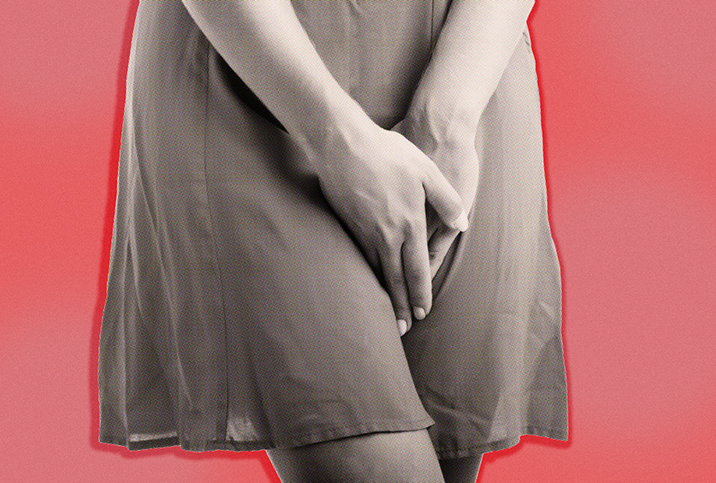Is It Possible to Be Too Tight?

A subject multiple partners have commented on is the tightness they feel during sex. This is sometimes viewed as a sign someone lacks sexual experience, though I can assure you that for me, that's not the case. Why, then, do some vaginas feel "tighter" than others? And does this tightness reveal anything about their sexual history? Furthermore, what's the appeal of a tight vagina?
Tightness can actually serve as a warning someone's not aroused enough for penetration, said U.K.-based sex therapist Tatyana Dyachenko.
"When a person with a vagina gets sexually stimulated, their vagina walls relax," she explained. "Anxiety, in particular, can make the vagina muscles contract." So, if someone feels tight, this may mean more foreplay, relaxation and/or lube are necessary.
Edwina, a 55-year-old in the Midwest who serves as head writer and video/podcast personality for Bedbible.com, can attest to this.
"I have been told I was too tight on occasion," she said. "It was because I had just recovered from pelvic organ prolapse surgery and I was anticipating pain and just couldn't relax. However, with a great deal of lube and a healthy dose of making out, I eventually relaxed enough to where sex wasn't painful for me, and he said I was cozy, rather than too tight."
Tightness can also indicate dryness, since dryness increases friction, said Carol Queen, Good Vibrations staff sexologist. There are even vaginal "tightening creams," which contain a substance called alum that just dries the vagina out—not generally something to strive for, since it can lead to vaginal tearing.
Tightness isn't always a warning sign, though—it can simply be an indication of strong vaginal muscles. Vaginal tightness is "related to the tone of our PC [Kegel/pelvic floor] muscles, since they surround the vagina and anus, and their tightness (in general, and ability to tighten and relax at will) is very relevant to how tight we might feel," said Queen. So, if you do regular kegel exercises, your pelvic floor muscles (and, hence, your vagina) might be tighter, said Dyachenko.
In addition, some differences in tightness may just be due to genetics.
"Everyone's body is different, and every vagina is different," Dyachenko said. Everyone's penis is also different, so if someone with a penis perceives a vagina as "tight" or "loose" due to the way they feel during intercourse, that could also be a function of their penis size or shape, Queen pointed out.
'Having a lot of sex does not make the vagina tighter or looser. That is a myth started by people to stop women from being promiscuous.'
Contrary to popular belief, the tightness of someone's vagina doesn't indicate how much sex they've had.
"Having a lot of sex does not make the vagina tighter or looser," Dyachenko said. "That is a myth started by people to stop women from being promiscuous. Having sex has no effect on the vagina."
If anything, it could be the opposite, she adds: Since the vagina contracts during orgasm similar to when performing Kegels, having lots of sex and orgasms might strengthen (and therefore tighten) your vagina over time.
One thing that actually can affect how tight someone feels is childbirth, although this will vary based on their individual experience.
"If the person has had multiple vaginal births, that can increase the chances of vaginal looseness or fatigue, and cause incomplete recovery of vaginal tightness," Dyachenko said. "If the person experienced vaginal trauma during childbirth, that can also increase the chances of the person not fully recovering to their pre-childbirth vaginal tightness."
Jamie, a 42-year-old trainer and dietician in Philadelphia, noticed this with his wife.
"We have both noticed that her vagina was tighter before she had our two kids," he said. "She has told me that she can tell that her outer and inner lips don't wrap around my penis like they used to. That is the best way I can describe it: Her vagina used to wrap around my penis more."
He added that this change was not so pronounced it compromised their sex life, "It was a very gradual change. Sex still feels great, and neither one of us lacks enjoyment due to it."
Even after giving birth, the tightness of someone's vagina is largely within their control, Queen said. "Post-birth, a person is encouraged to do Kegels to address the changes pregnancy and birth can bring to the vagina and its environment."
Finally, some people have a medical condition called vaginismus, in which the vagina tightens too much for penetration to occur. Vaginismus can also involve muscle spasms and pain outside of sex, and has many possible root causes, from sexual trauma to doing Kegels incorrectly, Queen said. (When doing Kegels, it's important that you relax your vaginal muscles after squeezing them.)
Queen recommends that anyone with this issue— or any chronic problems with vaginal tightness—see a pelvic floor physical therapist who can assess the underlying problem and recommend methods to loosen the vaginal muscles.
The tightness of someone's vagina doesn't tell you much about their sexual history, and tighter is not necessarily better. In fact, if you or your partner seems excessively tight, that may be a call for more warming up before penetration—and if it becomes an ongoing issue or there's pain involved, be sure to talk to a professional.




















